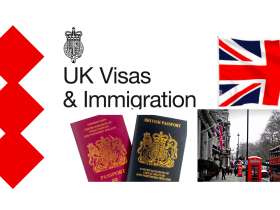UK Closes Caregiver Visa Route for Foreign Workers: The United Kingdom has announced sweeping changes to its immigration system, marking a new era for foreign workers, particularly those in the caregiving sector. The new rules, described as a “complete reset,” are aimed at reducing net migration and encouraging local workforce development.
These changes are set to take effect from July 22, 2025, and they come with major implications for Nigerians and other foreign nationals who had hoped to work in the UK as caregivers.
No More Overseas Caregiver Recruitment
One of the most impactful changes in the new policy is the closure of the overseas recruitment route for social care workers. Starting July 22, 2025, foreign nationals will no longer be able to apply for caregiver jobs from outside the UK. For instance, if you are in Nigeria and desire to work in the UK, the window has closed for you to apply from outside the UK.
What This Means:
No new visa applications for care roles will be accepted from abroad.
However, care workers already in the UK will be allowed to switch visa types internally up until July 2028.
This move is part of the UK government’s broader effort to reduce dependency on low-paid foreign labour and instead invest in domestic training and employment solutions.
More Read
Higher Requirements for Skilled Worker Visas
The UK is also increasing the bar for skilled worker visa applicants. Under the new rules:
Most applicants must now hold at least a bachelor’s degree or its equivalent.
Salary thresholds have been raised to reflect the latest figures from the Office for National Statistics (ONS).
That means if you’re planning to apply for a skilled job in the UK, you’ll need both higher qualifications and a competitive job offer that meets the updated salary standards.
Exemptions:
These new requirements do not apply to those already living and working in the UK under existing permits.
Drastic Reduction in the Shortage Occupation List
Another major update is the reduction of the Shortage Occupation List. That is, a list that previously allowed employers to fast-track foreign workers into high-demand jobs with lower salary thresholds and visa fees.

What’s Changing:
Over 100 roles, including chefs and plasterers, are being removed from the list.
A smaller “critical roles” list will remain, but these jobs will no longer:
Benefit from discounted visa fees
Allow dependents to be brought along
The UK’s Migration Advisory Committee (MAC) will review this temporary list to determine which roles, if any, should be retained beyond 2026.
Government’s Rationale: Cutting Migration, Boosting Local Talent
According to UK Home Secretary Yvette Cooper, the reforms aim to:
Reduce migration to more sustainable levels
Tackle exploitation in the care sector
Encourage training and hiring from within the UK
“We are delivering a complete reset of our immigration system to restore proper control and order, after the previous government allowed net migration to quadruple in four years,” Cooper told Members of Parliament.
Meanwhile, Seema Malhotra, Minister for Migration and Citizenship, confirmed that the Migration Advisory Committee will oversee the review of salary bands and exemptions to ensure a fair and updated system.
What This Means for Nigerians and International Job Seekers
For thousands of Nigerians hoping to use the caregiver route as a gateway into the UK job market, this is certainly a major setback. However, opportunities still exist in other skilled professions, especially for those who meet the updated requirements in healthcare, tech, and engineering.
Alternative Immigration Routes to the UK
Aside from the caregiver pathway, which has now been closed, there are still several legal and viable routes available for UK-bound individuals. If you’re determined to achieve your dream of relocating to the UK, here are carefully researched alternative pathways you can consider:
1. Skilled Worker Visa
For professionals with a job offer in eligible occupations (e.g., healthcare, IT, and engineering).
See details of the Skilled Worker Visa
2. Health and Care Worker Visa
For doctors, nurses, and other health professionals employed by the NHS or licensed care providers.
See details of Health and Care Worker Visa
3. Student Visa
For those admitted to a UK educational institution. Allows part-time work and a possible post-study visa.
See details of Student Visa
4. Graduate Visa (Post-Study Work Visa)
For international students who complete a degree in the UK, valid for 2–3 years.
See details of Graduate (Post-Study Work Visa
5. Global Talent Visa
For highly skilled individuals in academia, arts, science, or tech, it doesn’t require a job offer.
See details of Global Talent Visa
6. Youth Mobility Scheme (18–30 years)
Limited to eligible nationalities, but Nigerians may access it in the future through bilateral agreements.
7. Family Visa
For those joining a spouse, fiancé(e), or family member who is a UK citizen or resident.
See details of Family Visa
8. Innovator Founder Visa
For entrepreneurs looking to start a business in the UK with a scalable idea.
See details of Innovator Founder Visa
EF Global Travels Is Here to Help
While these changes may seem discouraging, your dream of working or relocating abroad doesn’t have to end. At EF Global Travels, we specialize in guiding Nigerians and other international clients through ever-evolving immigration landscapes.
Whether you are exploring new job opportunities in the UK, Canada, Australia, or elsewhere, we’re here to help with professional support, visa application guidance, and immigration planning every step of the way.
📧Email us:
📱Chat with us on WhatsApp:
Final Thoughts
The UK’s decision to shut down the overseas caregiver recruitment route reflects a larger shift in its immigration approach. Now more than ever, it’s important to stay informed and work with trusted travel and immigration consultants who can guide you through alternative pathways.
At EF Global Travels, your goals are our mission.
Let’s make your next move a successful one!






Leave a Review